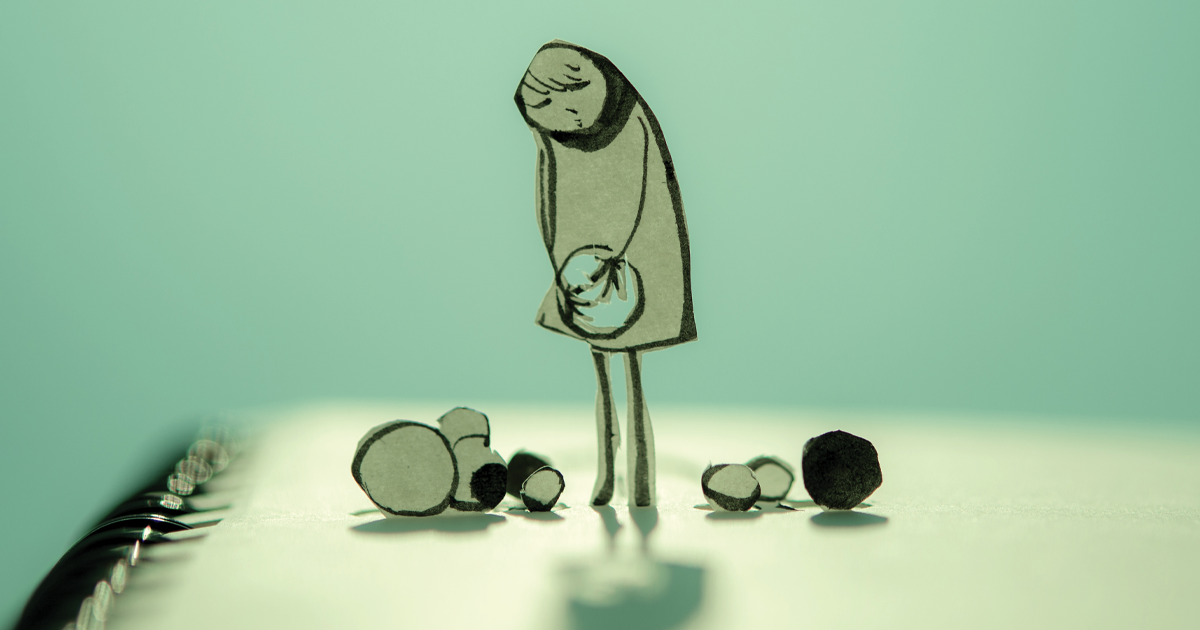Entrusted with Suffering
"I have a great life, but the thought of seeing Jesus and being welcomed into His presence sooner rather than later was thrilling to me."
As I opened the envelope from the Department of Transportation and pulled out the familiar blue placard featuring a white wheelchair, mixed emotions filled my heart. Gratitude and relief were first, knowing I wouldn’t have to do so much walking. But there was a little despair too. It made my disability all too real.
How did I get here? Three years ago, I was running three miles a day, playing volleyball and chasing after my granddaughter with little effort. But then I got sick was put on a flouroquinolone antibiotic that fights infections in the body. The medication prescribed can have serious side effects, such as tendon and nerve damage. The black box warning on the box makes that clear. I didn’t think much about it, but two days later, I woke up with extreme pain in both Achilles, as if they were about to snap. I couldn’t close my hands or bend my hips. My eyes felt like they were being pushed out of their sockets. Every tendon in my body was painful. Then came migraines and insomnia.
After about six months of excruciating pain, things started improving. I thought I was recovering. But after two years of improvements and some setbacks, the pain returned, along with weakness in my hands, annoying brain fog, an irregular heartbeat and disabling fatigue. So, I started looking for answers. I knew it would be an uphill battle. We had already learned that, while doctors knew this side effect can happen, none of them were certain about what to do when it does happen.
But the next trip to my doctor got the ball rolling. Because of the collection of symptoms, she felt there was an underlying cause, Mitochondrial Disease. Mitochondria are in every cell. They are responsible for 90% of a cell’s energy. If they are damaged or diseased, body systems won’t work right. It sounded promising. I went home and researched “Mito.” It did not sound promising after all. There is no treatment and no cure. Some people live with it long term, with increasing disability. But everything I read boiled down to one phrase: Mitochondrial Disease speeds aging and death. In fact, sudden death is one of the symptoms. Damaged mitochondria in the organs requiring the most energy (the brain, heart and liver) could cause vital organs to fail at any time.
The medication I was on damages mitochondria in some people, which causes severe pain and tendon ruptures. That condition is called Fluoroquinolone Associated Disability (FQAD). That’s the condition we know I have. But the medication could have just exacerbated a genetic form of Mitochondrial Disease. At the time of this writing, we were awaiting genetic test results that should give us some answers. If it is not the genetic form of the disease, there is a small chance the damage could be reversed. But if it is genetic, then the prognosis is not good.
I have to admit, when I first learned my life could be shorter than average or even end suddenly or soon, I was kind of excited. I know that will sound strange to some, or that I’m just crazy. I have a great life, but the thought of seeing Jesus and being welcomed into His presence sooner rather than later was thrilling to me. Of course, it could happen to any of us at any time, but when you get a possibly life-threatening diagnosis, it brings thoughts of heaven into sharp focus.

While we were on vacation last summer, I read three books. Two of the three used a phrase that intrigued me. The authors felt God had “entrusted” suffering to them. One of the books was on living with chronic pain, “Help, Lord, I’m Coming Apart at the Seams,” by Barbara Haley. The other book was an unexpected one in which to find encouragement in suffering. It was Nick Foles’ book, “Believe It.” It is the story of Nick’s football career and Super Bowl win. But what I didn’t expect was a chapter on his wife’s chronic illness. He talked about their frustration in trying to find a diagnosis and then dealing with the diagnosis. When he echoed Barbara Haley’s words, that they believed God had entrusted them with this illness, I decided to spend some time thinking on that idea.
What I learned is when I looked at my illness and resulting disability as a gift from God, something He has entrusted me with, it changed my perspective. It became something positive, something He ordained into my life for a purpose. What would I do with it? How would I glorify Him in it? God expects us to use the gifts He entrusts us with for the praise of His glory, the increase of His Kingdom and the edification of His body. I pray that He allows me to do that with this gift.
The other thing I’ve come to understand is how precious life is at every stage. My illness has me asking questions about end-of-life decisions. I’ve learned that life is precious and meaningful at every stage and in every form, even life marred by disabilities. My husband and I had to have conversations about my wishes should I have a sudden event—heart attack or stroke. At first, I didn’t want him to do anything, just let me die. Life without this damaged body would be so much better. But then I realized, if I’m serious about being pro-life, I should be protecting life at this age with as much vigor as if it was an unborn baby. There will come a time when life is no longer possible in this body. But for now, he should do all he can to save my life.
I have made it my aim to live out Philippians 1:20-22, “For I fully expect and hope that I will never be ashamed, but that I will continue to be bold for Christ, as I have been in the past. And I trust that my life will bring honor to Christ, whether I live or die. For to me, living means living for Christ, and dying is even better. But if I live, I can do more fruitful work for Christ. So I really don’t know which is better.” Even as sick as I have been, God has given me fruitful work. I completed my book about overcoming child sexual abuse and speak to more people and groups than ever before. My plan is to be as fruitful in ministry as possible for as long as possible.
Finally, it has been a rough three years, but God’s grace has been sufficient, and I know suffering is only for a short time. “For our present troubles are small and won’t last very long. Yet they produce for us a glory that vastly outweighs them and will last forever!” (2 Corinthians 4:17).
Lisa J. Radcliff of Pennsburg, PA is a speaker and author of “Hidden with Christ: Breaking Free from the Grip of Your Past.” She and husband Doug, celebrated 35 years of marriage in May and enjoy spending time with their kids and grandkids.







